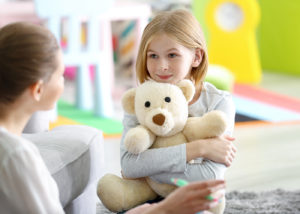Counseling Services for Adults, Children & Families

Therapeutic Services
Our therapeutic services team specializes in infant and early childhood mental health to help caregivers and children find pathways to heal from traumatic experiences and have healthy, safe, secure and more rewarding relationships. We accomplish this by providing evidence-based, relationship-focused, hope-centered treatment services including family therapy, individual therapy, and protective parenting education groups. These services are designed to heal and strengthen families, as well as promote best parenting practices for future generations.
We serve children ages 0-12 and their caregivers, including both the biological family and foster family in treatment when possible. Our primary child & family treatments include:
- Child-Parent Psychotherapy (CPP)
- Trauma-Focused Cognitive Behavior Therapy (TF-CBT)
- Parent-Child Interaction Therapy (PCIT)
Additional treatments that may be available include: Attachment & Biobehavioral Catch-up (ABC), Eye Movement Desensitization and Reprocessing (EMDR), and Interpersonal Therapy for the Perinatal population (IPT).
Protective Parenting Education Groups currently offered:
Circle of Security Parenting®, Compassion Workshop, and Nurturing Parenting®.
If you are interested in services, you may contact the Therapeutic Services Admin team at 918-699-0500.
Please email OHS referrals to referrals@parentchildcenter.org
What is Child Parent Psychotherapy (CPP)?
Child-Parent Psychotherapy (CPP) is an intervention for children from birth through age 5 who have experienced at least one traumatic event (e.g., maltreatment, the sudden or traumatic death of someone close, a serious accident, sexual abuse, exposure to domestic violence) and, as a result, are experiencing behavior, attachment, and/or mental health problems, including posttraumatic stress disorder (PTSD). The primary goal of CPP is to support and strengthen the relationship between a child and his or her parent (caregiver) as a vehicle for restoring the child’s sense of safety, attachment, and appropriate affect and improving the child’s cognitive, behavioral, and social functioning.
Additional information may be found at https://childparentpsychotherapy.com/.
What is Trauma-Focused Cognitive Behavioral Therapy (TF-CBT)?
Trauma-Focused Cognitive Behavioral Therapy (TF-CBT) is a psychosocial treatment model designed to treat posttraumatic stress and related emotional and behavioral problems in children and adolescents (can be developmentally modified for children 3 up to age 18). TF-CBT is a helpful treatment with children who have a wide array of traumatic experiences, including domestic violence, traumatic loss, and the often multiple psychosocial traumas experienced by children prior to foster care placement. The treatment model is designed to be delivered by trained therapists who initially provide parallel individual sessions with children and their parents (or guardians), with conjoint parent-child sessions increasingly incorporated over the course of treatment.
Additional information may be found at https://oklahomatfcbt.org/.
What is Parent-Child Interaction Therapy (PCIT)?
Parent-Child Interaction Therapy (PCIT) is an evidenced-based treatment for young children (typically ages 2-8) that places emphasis on improving the quality of the parent-child relationship and changing parent-child interaction patterns. In PCIT, parents are taught specific skills to establish a nurturing and secure relationship with their child while increasing their child’s prosocial behavior and decreasing negative behavior. This treatment focuses on two basic interactions: Child Directed Interaction (CDI) is similar to play therapy in that parents engage their child in a play situation with the goal of strengthening the parent-child relationship; Parent Directed Interaction (PDI) resembles clinical behavior therapy in that parents learn to use specific behavior management techniques as they play with their child. PCIT is especially effective with children who have experienced parental substance abuse or child abuse/neglect, display defiance, acting-out behaviors, attention difficulties, and/or significant troubles with minding and listening.
Additional information may be found at https://www.pcit.org/.
What are Protective Parenting Education Groups?
Circle of Security Parenting
Circle of Security Parenting® meets weekly for up to 90 minutes per week for 8 weeks. The goal of this group focuses on enhancing a caregivers’ understanding of attachment and developmentally appropriate behaviors and how to correctly read and respond to a child’s needs.
Topics Include:
- Introduction to Circle of Security Parenting
- Exploring Children’s Needs Around the Circle
- “Being With” on the Circle
- Being with Infants on the Circle
- The Path to Security
- Exploring Our Struggles
- Rupture and Repair in Relationships
Compassion Workshop
Compassion Workshop meets for up to 90 minutes per week for 10 weeks. The goal of this group is to help caregivers learn to regulate their emotions through the HEALS technique, as well as to increase their ability to have compassion for themselves and others.
Topics Include:
- Understanding causes of anger
- Recognizing core hurts
- Learning to recognize and access core values
- Recognizing genuine self-esteem
- Learning and practicing an emotional technique called HEALS
- Understanding and practicing compassionate parenting
- Understanding resentment and forgiveness
Nurturing Parenting
Nurturing Parenting® meets for up to 90 minutes per week for 13 weeks. The goal of this group is to reduce risk for child abuse and neglect across five areas including: increasing developmental appropriateness of expectations of children, increased empathy for children, decreasing use of corporal punishment, increasing appropriateness of caregiver and child roles, and increasing tolerance for children’s power and independence.
Topics include:
- Developing family morals, values, and rules
- Giving and receiving positive recognition
- Needs and Empathy
- Childhood development and appropriate expectations
- Encouraging appropriate behavior
- Ignoring irritating behavior
- Emotion identification and communication
- Expressing anger without violence
- Disciplining without spanking, hitting, or yelling
- Establishing nurturing parenting routines
- Practicing nurturing self-care
- Problem solving, decision making, negotiation, and compromise
- Sexual health, personal space, and respect
- Effects of substance use and domestic violence on children

